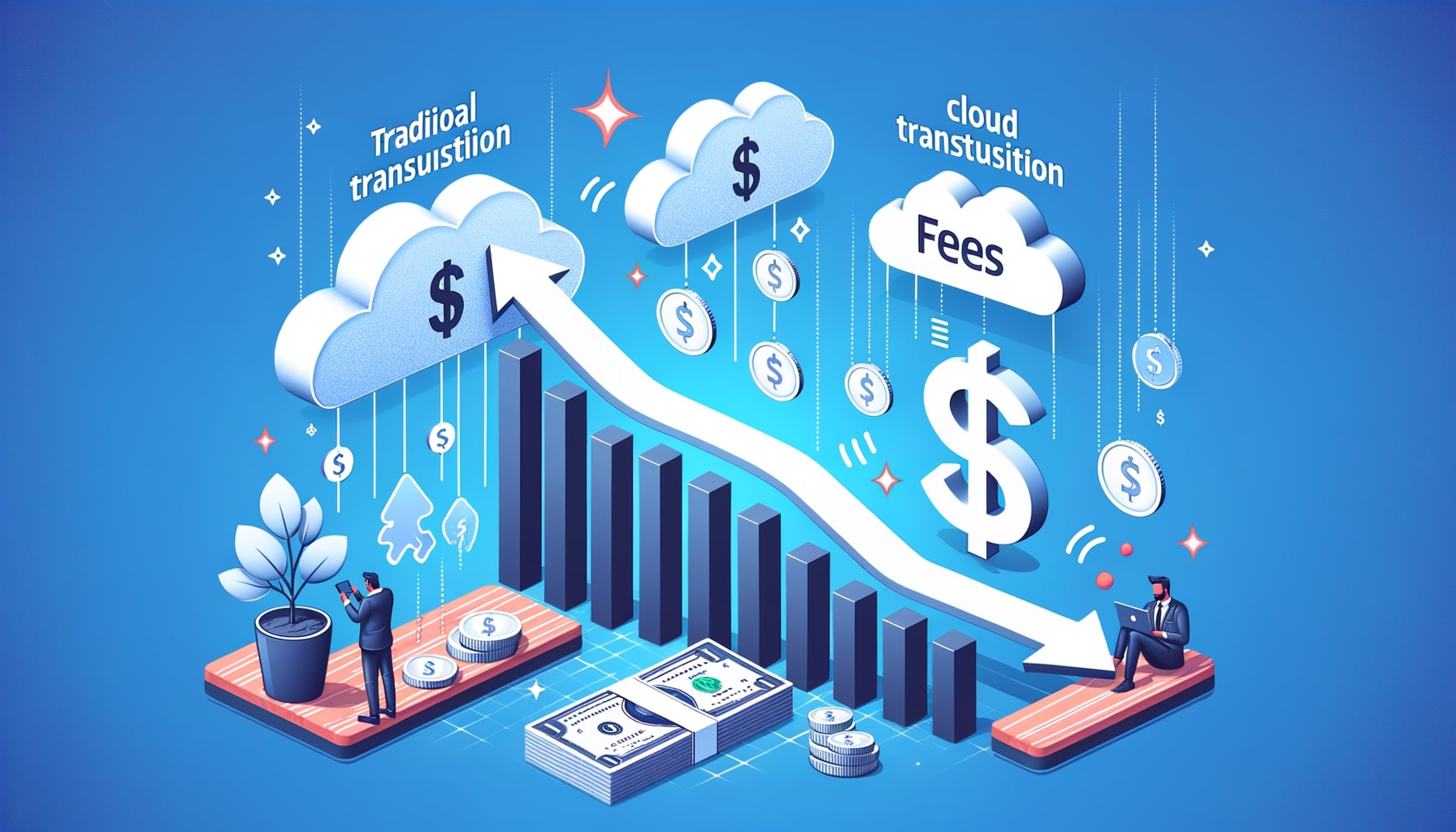The Future of Credit Card Processing in the Cloud
Credit card processing has come a long way since its inception. From manual imprinters to electronic point-of-sale (POS) systems, the industry has continuously evolved to meet the needs of businesses and consumers. One of the latest advancements in credit card processing is the adoption of cloud-based systems.
This article will explore the future of credit card processing in the cloud, including its benefits, challenges, implementation process, security measures, integration with existing systems, and future trends.
Understanding Cloud-Based Credit Card Processing Systems
Cloud-based credit card processing systems leverage the power of the internet and cloud computing to securely process credit card transactions. Instead of relying on physical hardware and software installed on-site, businesses can access their credit card processing system through a web browser or mobile application. These systems store and process sensitive customer data in the cloud, eliminating the need for businesses to invest in expensive infrastructure and maintenance.
Benefits of Cloud-Based Credit Card Processing
- Cost Savings: Cloud-based credit card processing systems eliminate the need for businesses to purchase and maintain expensive hardware and software. Instead, they pay a monthly subscription fee based on their usage. This allows businesses to allocate their resources more efficiently and reduce their overall operating costs.
- Scalability: Cloud-based systems offer businesses the flexibility to scale their credit card processing capabilities as their needs change. Whether a business experiences seasonal fluctuations or rapid growth, cloud-based systems can easily accommodate increased transaction volumes without the need for additional hardware or software upgrades.
- Accessibility: With cloud-based credit card processing, businesses can access their system from anywhere with an internet connection. This enables remote and mobile sales teams to process transactions on the go, improving customer service and increasing sales opportunities.
- Integration: Cloud-based credit card processing systems can seamlessly integrate with other business applications, such as accounting software, customer relationship management (CRM) systems, and inventory management tools. This integration streamlines operations, reduces manual data entry, and provides businesses with a holistic view of their financials.
- Enhanced Security: Cloud-based credit card processing systems often employ advanced security measures to protect sensitive customer data. These measures include encryption, tokenization, and compliance with industry standards such as the Payment Card Industry Data Security Standard (PCI DSS). By leveraging the expertise of cloud service providers, businesses can enhance their security posture and reduce the risk of data breaches.
Challenges and Concerns in Cloud-Based Credit Card Processing
While cloud-based credit card processing offers numerous benefits, there are also challenges and concerns that businesses should be aware of.
- Internet Reliability: Cloud-based systems rely on a stable internet connection to process transactions. If the internet goes down, businesses may experience disruptions in their credit card processing capabilities. To mitigate this risk, businesses should consider implementing backup internet connections or offline processing options.
- Data Security: While cloud-based credit card processing systems offer enhanced security measures, businesses must still ensure that they are compliant with industry regulations and standards. This includes regularly updating software, implementing strong access controls, and conducting regular security audits.
- Vendor Reliability: Businesses must carefully select a reputable and reliable cloud service provider for their credit card processing needs. It is essential to assess the provider’s track record, financial stability, and customer support capabilities to ensure a smooth and secure processing experience.
- Data Ownership and Control: When using cloud-based systems, businesses must understand the terms and conditions regarding data ownership and control. It is crucial to have a clear understanding of who owns the data, how it is stored, and what rights businesses have in terms of accessing and retrieving their data.
Implementing Cloud-Based Credit Card Processing: A Step-by-Step Guide
Implementing cloud-based credit card processing involves several key steps. Here is a step-by-step guide to help businesses navigate the implementation process:
- Assess Business Needs: Before selecting a cloud-based credit card processing system, businesses should assess their specific needs and requirements. This includes considering transaction volumes, integration capabilities, reporting requirements, and budget constraints.
- Research Cloud Service Providers: Conduct thorough research to identify reputable cloud service providers that specialize in credit card processing. Consider factors such as pricing, security measures, customer support, and integration capabilities.
- Select a Provider: Based on the research conducted, select a cloud service provider that aligns with the business’s needs and requirements. Consider factors such as pricing, contract terms, and service level agreements.
- Set Up the System: Work with the cloud service provider to set up the credit card processing system. This may involve configuring payment gateways, integrating with existing systems, and customizing settings to meet the business’s specific needs.
- Train Staff: Provide comprehensive training to staff members who will be using the cloud-based credit card processing system. This includes training on how to process transactions, handle refunds, and troubleshoot common issues.
- Test and Launch: Conduct thorough testing of the system to ensure that it is functioning correctly and meeting the business’s requirements. Once testing is complete, launch the system and begin processing credit card transactions.
Security Measures in Cloud-Based Credit Card Processing
Security is a top concern when it comes to credit card processing, especially in the cloud. Cloud-based credit card processing systems employ several security measures to protect sensitive customer data:
- Encryption: Data encryption is a fundamental security measure used in cloud-based credit card processing. Encryption ensures that data is securely transmitted and stored, making it unreadable to unauthorized individuals.
- Tokenization: Tokenization replaces sensitive credit card data with unique tokens. These tokens are used for transaction processing, while the actual card data is securely stored in the cloud. This reduces the risk of data breaches as tokens have no value to potential attackers.
- PCI DSS Compliance: The Payment Card Industry Data Security Standard (PCI DSS) is a set of security standards that businesses must adhere to when processing credit card transactions. Cloud-based credit card processing systems should be PCI DSS compliant to ensure the protection of customer data.
- Access Controls: Cloud-based systems should implement strong access controls to prevent unauthorized access to sensitive data. This includes multi-factor authentication, role-based access controls, and regular password updates.
- Regular Audits: Regular security audits should be conducted to identify and address any vulnerabilities in the cloud-based credit card processing system. These audits can help businesses stay ahead of emerging threats and ensure ongoing compliance with security standards.
Integrating Cloud-Based Credit Card Processing with Existing Systems
Integrating cloud-based credit card processing with existing systems can streamline operations and improve efficiency. Here are some key considerations when integrating cloud-based credit card processing with existing systems:
- Compatibility: Ensure that the cloud-based credit card processing system is compatible with existing systems, such as accounting software, CRM systems, and inventory management tools. This may involve custom development or utilizing pre-built integrations provided by the cloud service provider.
- Data Synchronization: Establish a process for synchronizing data between the cloud-based credit card processing system and existing systems. This ensures that transaction data is accurately reflected in other business applications, reducing the need for manual data entry.
- Reporting and Analytics: Determine how transaction data from the cloud-based credit card processing system will be used for reporting and analytics purposes. This may involve setting up automated reporting or integrating with business intelligence tools to gain insights into sales performance and customer behavior.
- Training and Support: Provide training and support to staff members who will be using the integrated system. This includes training on how to access and utilize transaction data from the cloud-based credit card processing system within existing systems.
Future Trends in Cloud-Based Credit Card Processing
The future of credit card processing in the cloud holds several exciting trends that will shape the industry. Here are some key trends to watch out for:
- Mobile Payments: With the increasing adoption of smartphones and mobile wallets, mobile payments are expected to become more prevalent. Cloud-based credit card processing systems will need to adapt to support mobile payment technologies and provide a seamless user experience.
- Artificial Intelligence (AI): AI-powered technologies, such as machine learning and natural language processing, have the potential to revolutionize credit card processing. These technologies can help detect fraudulent transactions, personalize customer experiences, and automate manual processes.
- Internet of Things (IoT): The IoT is expanding rapidly, with connected devices becoming more prevalent in various industries. Cloud-based credit card processing systems will need to integrate with IoT devices to enable seamless and secure payment experiences.
- Blockchain Technology: Blockchain technology has the potential to enhance security and transparency in credit card processing. By leveraging blockchain, businesses can ensure the immutability of transaction records and reduce the risk of fraud.
- Enhanced Data Analytics: As businesses collect more transaction data, the ability to analyze and derive insights from this data will become increasingly important. Cloud-based credit card processing systems will need to provide robust analytics capabilities to help businesses make data-driven decisions.
Frequently Asked Questions (FAQs)
Q.1: Is cloud-based credit card processing secure?
Yes, cloud-based credit card processing systems employ advanced security measures such as encryption, tokenization, and compliance with industry standards like PCI DSS to protect sensitive customer data.
Q.2: How does cloud-based credit card processing save costs?
Cloud-based credit card processing eliminates the need for businesses to invest in expensive hardware and software. Instead, they pay a monthly subscription fee based on their usage, resulting in cost savings.
Q.3: Can cloud-based credit card processing integrate with existing systems?
Yes, cloud-based credit card processing systems can seamlessly integrate with existing systems such as accounting software, CRM systems, and inventory management tools. This integration streamlines operations and reduces manual data entry.
Q.4: What are the future trends in cloud-based credit card processing?
Future trends in cloud-based credit card processing include mobile payments, AI-powered technologies, IoT integration, blockchain technology, and enhanced data analytics.
Conclusion
The future of credit card processing lies in the cloud. Cloud-based systems offer numerous benefits, including cost savings, scalability, accessibility, integration capabilities, and enhanced security. While there are challenges and concerns to address, businesses can navigate the implementation process by following a step-by-step guide.
By leveraging advanced security measures, integrating with existing systems, and staying ahead of future trends, businesses can embrace the future of credit card processing in the cloud and unlock new opportunities for growth and success.










